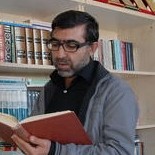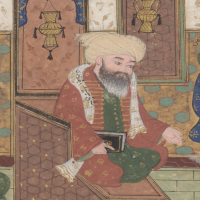Research Article
Translation
Aim & Scope
UMDE Dini Tetkikler Dergisi-UMDE Journal of Religious Inquiries is a peer-reviewed journal published twice a year as July and December. It
aims to publish scientific research such as research articles, translations, papers and reviews (for books, articles, theses, projects, symposium and conferences) on religious studies and to share these studies with
public. UMDE Journal of Religious Inquiries provides
articles written by qualified specialists in the area of Religious and Islamic
Studies (Scope: Arts and Humanities/Religion/Islamic Studies &
Scope: Social and Behavioral Sciences/ Theology and Ethics).
UMDE Journal of Religious Inquiries is an academic refereed journal dedicated to publish the works primarily within the fields of Religious and Islamic Studies including Arts and Humanities, Religion, Islamic Studies as well as Social and Behavioral Sciences, Theology and Ethics.
Scope: Arts and Humanities/Religion/Islamic Studies/Comparative Religious Studies
Scope: Social and Behavioral Sciences/ Theology and Ethics
Author Guidelines
UMDE Dini Tetkikler Dergisi - UMDE Journal of Religious Inquiries is a peer-reviewed journal published twice a year as July and December (30th July and 30th December).
Authors transfer (assign) the copyright in their articles to UMDE Journal of Religious Inquiries before publication. The authors should prepare a copyright transfer form signed by all authors. Unless otherwise specified, written communication will be carried on with the first author, at all. The intention of having the disposed paper to be published in our Journal as well as the preferred section (research, review, case reports or letter to the editor) should clearly be indicated in the paper.
UMDE Journal of Religious Inquiries does not charge any article submission, processing charges, and printing charge from the authors.
UMDE Journal of Religious Inquiries requires writers to use the ISNAD Citation Style.
- Authors transfer (assign) the copyright in their articles to UMDE Journal of Religious Inquiries before publication. The authors should prepare a copyright transfer form signed by all authors. Unless otherwise specified, written communication will be carried on with the first author, at all. The intention of having the disposed paper to be published in our Journal as well as the preferred section (research, review, case reports or letter to the editor) should clearly be indicated in the paper.
SEE, ARTICLE PRELIMINARY REVIEW FORM
SEE, TRANSLATION EVALUATION FORM
SEE, CODE OF CONDUCT AND BEST PRACTICE GUIDELINES FOR JOURNAL EDITORS
SEE, DOCTORAL DISSERTATION SUMMARY REVIEW FORM
SEE, REVIEW FORM FOR BOOK REVIEWS
SEE, Referee Process
THE ISNAD CITATION STYLE
a) One Author:
1. Michael Pollan, The Omnivore’s Dilemma: A Natural History of Four Meals (New York: Penguin, 2006), 99–100.
2. Pollan, Omnivore’s Dilemma, 3.
Bibliography:
Pollan, Michael. The Omnivore’s Dilemma: A Natural History of Four Meals. New York: Penguin, 2006.
b) Two Authors
1. Geoffrey C. Ward and Ken Burns, The War: An Intimate History 1941–1945 (New York: Knopf, 2007), 52.
2. Ward and Burns, War, 59–61.
Bibliography:
Ward, Geoffrey C., and Ken Burns. The War: An Intimate History 1941–1945. New York: Knopf, 2007.
c) Three or More Authors
For three or more authors, list all of the authors in the bibliography; in the note, list only the first author, followed by et al. (“and others”):
1. Mitchell L. Eisen, Jodi A. Quas, and Gail S. Goodman, eds., Memory and Suggestibility in the Forensic Interview (Mahwah, NJ: L. Erlbaum Assoicates, 2002), 65.
2. Eisen and et al., Memory and Suggestibility in the Forensic Interview, 67.
Bibliography:
Eisen, Mitchell L., Jodi A. Quas, and Gail S. Goodman, eds. Memory and Suggestibility in the Forensic Interview. Mahwah, NJ: L. Erlbaum Associates, 2002.
d) Translation
1. Gabriel Garcia Marquez, Love in the Time of Cholera, trans. Edith Grossman (London: Cape, 1988), 242–55.
2. Marquez, Cholera, 33.
Bibliography:
Marquez, Gabriel Garcia. Love in the Time of Cholera. Translated by Edith Grossman. London: Cape, 1988.
e) Chapter or Other Part of a Book
1. John D. Kelly, “Seeing Red: Mao Fetishism, Pax Americana, and the Moral Economy of War,” in Anthropology and Global Counterinsurgency, ed. John D. Kelly et al (Chicago: University of Chicago Press, 2010), 77.
2. Kelly, “Seeing Red,” 81–82.
Bibliography:
Kelly, John D. “Seeing Red: Mao Fetishism, Pax Americana, and the Moral Economy of War.” In Anthropology and Global Counterinsurgency, edited by John D. Kelly, Beatrice Jauregui, Sean T. Mitchell, and Jeremy Walton, 67–83. Chicago: University of Chicago Press, 2010.
ARTICLE
a)Printed
1. Joshua I. Weinstein, “The Market in Plato’s Republic,” Classical Philology 104 (2009): 440.
2. Weinstein, “Plato’s Republic,” 452–53.
Bibliography:
Weinstein, Joshua I. “The Market in Plato’s Republic.” Classical Philology 104 (2009): 439–58.
b) Online
1. Gueorgi Kossinets and Duncan J. Watts, “Origins of Homophily in an Evolving Social Network”, American Journal of Sociology 115 (2009): 411, accessed February 28, 2010, doi:10.1086/599247.
2. Kossinets and Watts, “Origins of Homophily,” 439.
Bibliography:
Kossinets, Gueorgi, and Duncan J. Watts. “Origins of Homophily in an Evolving Social Network.” American Journal of Sociology 115 (2009): 405–50. Accessed February 28, 2010. doi:10.1086/599247.
ENCYCLOPEDIA ENTRIES
For encylopedia entries, the author’s name and surname are written first. These are followed by the title of the entry in quotation marks, the full name of the encyclopedia, , the place and date of publication, its volume number and page numbers:
1. As’ad Abukhalil, “Maronites,” in Encyclopedia of the Modern Middle East and North Africa, ed. Philip Mattar, 2nd ed., vol. 3 (New York: Macmillan Reference, 2004), 1491-92.
2. Abukhalil, “Maronites,” 1492.
Bibliography:
Abukhalil, As’ad. “Maronites.” In Encycloedia or the Modern Middle East and North Africa. Edited by Philip Mattar. 2nd ed. Vol. 3. New York: Macmillan Reference, 1491-92.
DISSERTATION
For theses and dissertations, the following order should be followed: name of the author and surname, full title of thesis in italics, thesis type, the name of the university and date.
1. Mihwa Choi, “Contesting Imaginaires in Death Rituals during the Northern Song Dynasty” (PhD diss., University of Chicago, 2008), 55.
2. Choi, “Contesting Imaginaires,” 59.
Bibliography:
Choi, Mihwa. “Contesting Imaginaires in Death Rituals during the Northern Song Dynasty.” PhD diss., University of Chicago, 2008.
THE ISNAD CITATION STYLE
Carefully chosen and well-prepared figures, such as diagrams and photographs, can greatly enhance your article. We encourage you to prepare figures that are clear, easy to read and of the best possible quality. Characters should appear as they would be set in the main body of the article. We will normally use figures as submitted; it is, therefore, your responsibility to ensure that they are legible and technically correct.
How to submit a new article
Please submit all new articles via the 'Submit an article' link on the journal homepage. Please ensure that you enter all the required information about your article and all its authors before uploading your files. You are required to select some keywords for your article. Please note that, if your article is accepted for publication, we will display these keywords in the published article. Authors may propose preferred (and non-preferred) referees on submission. The suggested referees should have suitable subject expertise and not have any conflicts of interest (please see the Peer Review Policy for further information on conflict of interest). These suggestions will be considered; however, the editorial staff and/or the Editorial Board will make the final decision regarding referee selection.
If you are a new author, you will need to set up an author account before submitting your first article. Using the Author Centre, you will be able to track the progress of your article, respond to the referee reports, and submit your revised version.
When submitting a new article, we only require you to upload a single Word file and any relevant supplementary data at this stage. The Word should contain your complete manuscript, including any embedded figures and tables. You may upload your article from the arXiv directly by entering the arXiv e-print number. Please also submit any permissions that you have already obtained at this stage.
If you experience any problems submitting your article online, please contact the journal team for assistance: umde@nevsehir.edu.tr
How to prepare your revised article
It is common for our referees to request that authors make revisions to their articles. If you are asked to submit a revised version of your article, in addition to article files, we require a list of changes made and a point-by-point response (even if you disagree) to each referee comment before we consider the revision. We recommend that authors copy each referee comment into a separate document and add a response below each comment (and refer to the manuscript line numbers when referring to changes in the main text) to assist our staff and referees with checking revisions as quickly as possible. If the referee(s) and Editorial Board are not satisfied with the changes to your manuscript, it may still be rejected at this stage. Please make sure that you send your revised article to us and not simply the original version again. By observing these guidelines you will be assisting the referees, who give up their time to review manuscripts.
How to submit a revised article
Please submit all revised submissions via the link in the e-mail you received informing you of the decision and asking you to make the revisions.
When submitting a revised article, we require you to upload the revised Word file (deleting the original version) and your latest set of source files used to create the revised Word. In addition, you will need to submit your point-by-point response to the referees. You will subsequently be asked to complete and submit the online assignment of copyright form if you have not done so already.
If you experience any problems submitting your article online, please contact the journal team for assistance: umde@nevsehir.edu.tr
What we do with articles after acceptance
After acceptance your article will be copy-edited and typeset, using the source files that you have provided, and a proof will be produced.
Proofs
We will contact you by e-mail when the PDF proof of your article is ready for you to check.
You should check your proof carefully and return corrections using the web page provided. This is the most efficient way to send them to us. Please supply an annotated PDF file using the strikethrough, replacement text, and insert text functions. For other changes, please add a sticky note. Please ensure all changes are visible via the ‘Comments’ list in the annotated PDF so that your corrections are not missed.
Please do not resupply a new source file because it is difficult to identify corrections and some could be missed.
The ultimate responsibility for ensuring the accuracy of the published article rests with you. If proofs reach you during an absence of which we have not been informed, or if the proofs are not returned sufficiently quickly, we may publish the article without your corrections.
When checking your proofs you should take particular care checking mathematics, tables, and references. Only essential corrections should be made. You should provide new files if figures need correction. We recommend that you check the accuracy of your original diagrams very carefully before submission; we cannot accept responsibility for any errors in original diagrams.
Copyright and permissions
Transfer of copyright
We request that authors transfer (assign) the copyright in their articles to Umde Dini Tetkikler Dergisi = UMDE Journal of Religious Inquiries before publication. This ensures that we have the right to work with, reproduce, and to make your article available to readers. This is the case whether you have chosen to publish on a subscription-only or on a gold open access basis. Following the submission of your article, we will ask you to electronically submit an Assignment of Copyright form. The assignment of copyright in your article is effective only from the date on which the article is accepted for publication. If you withdraw your article, or if it is not accepted, the transfer does not take effect.
The main features of the copyright assignment are that:
authors transfer the worldwide copyright in their work to Umde Dini Tetkikler Dergisi = UMDE Journal of Religious in all formats and media;
authors assert their moral right to be identified as the authors of the article;
for subscription-only articles, Umde Dini Tetkikler Dergisi = UMDE Journal of Religious grants back to authors certain rights for the future use of their own work, for example, self-archiving rights; for full details please see the Copyright FAQ;
authors of gold open access articles will have the same rights as all third parties – those described in the relevant Creative Commons license;
provision is made for situations where copyright is owned by an author’s employer as well as for government employees; in the case of multi-author articles, only one author should submit the form but he or she should have obtained the verbal agreement of all the other authors beforehand.
As well as addressing matters of copyright, the form contains assertions that all authors have received the final version of the article, have agreed to it being submitted, and that the content of the paper is not defamatory, fabricated, or infringement of third-party rights. Umde Dini Tetkikler Dergisi = UMDE Journal of Religioususes a single copyright form. Section 1 applies to authors submitting their work for subscription-only publication and Section 2 to those submitting for gold open access publication.
Ethical Principles and Publication Policy
Publication Ethics
The publication process at UMDE Journal of Religious Inquiries is the basis of the improvement and dissemination of information objectively and respectfully. Therefore, the procedures in this process improve the quality of the studies. Peer-reviewed studies are the ones that support and materialize the scientific method. At this point, it is of utmost importance that all parties included in the publication process (authors, readers and researchers, publisher, reviewers and editors) comply with the standards of ethical considerations. UMDE Journal of Religious Inquiries expects all parties to hold the following ethical responsibilities.
The following ethical duties and responsibilities are written in the light of the guide and policies made by Committee on Publication Ethics (COPE).
The publication of an article in a peer-reviewed journal is an essential building block in the development of a coherent and respected network of knowledge. It is a direct reflection of the quality of the work of the authors and the institutions that support them. Peer-reviewed articles support and embody the scientific method. It is therefore important to agree upon standards of expected ethical behavior for all parties involved in the act of publishing: the author, the journal editor, the peer reviewer, and the publisher.
1. Publication and authorship:
List of references, financial support;
No plagiarism, no fraudulent data;
Forbidden to publish same research in more than one journal.
2. Author’s responsibilities:
Authors obliged to participate in peer review process;
All authors have significantly contributed to the research;
Statement that all data in article are real and authentic;
All authors are obliged to provide retractions or corrections of mistakes.
3. Peer review/responsibility for the reviewers:
Judgments should be objective;
Reviewers should have no conflict of interest with respect to the research, the authors and/or the research funders;
Reviewers should point out relevant published work which is not yet cited;
Reviewed articles should be treated confidentially.
4. Editorial responsibilities:
Editors have complete responsibility and authority to reject/accept an article;
Editors should have no conflict of interest with respect to articles they reject/accept;
Only accept a paper when reasonably certain;
When errors are found, promote publication of correction or retraction;
Preserve anonymity of reviewers.
No plagiarism, no fraudulent data.
5. Publishing ethics issues
Monitoring/safeguarding publishing ethics by editorial board;
Guidelines for retracting articles;
Maintain the integrity of the academic record;
Preclude business needs from compromising intellectual and ethical standards;
Always be willing to publish corrections, clarifications, retractions, and apologies when needed.
Duties of the Publisher
UMDE Journal of Religious Inquiries is committed to ensuring that commercial revenue has no impact or influence on editorial decisions. In addition, UMDE Journal of Religious Inquiries will assist in communications with other journals and/or publishers where this is useful to editors. Finally, we are working closely with other publishers and industry associations to set standards for best practices on ethical matters, errors, and retractions–and are prepared to provide specialized legal review and counsel if necessary.
Plagiarism Detection
UMDE Journal of Religious Inquiries uses double-blind review fulfilled by at least two reviewers. In addition, all articles are checked by means of a program in order to confirm they are not published before and avoid plagiarism.
The peer review process is at the heart of the success of scientific publishing. As part of our commitment to the protection and enhancement of the peer review process, UMDE Journal of Religious Inquiries has an obligation to assist the scientific community in all aspects of publishing ethics, especially in cases of (suspected) duplicate submission or plagiarism.
When a reader discovers a significant error or inaccuracy in a paper published in UMDE Journal of Religious Inquiries have any other complaint about editorial content (plagiarism, duplicate papers, etc.), he/she should make a complaint by e-mail to umde@nevsehir.edu.tr
We welcome complaints as they provide an opportunity for improvement, and we aim to respond quickly and constructively.
See, Publishing Ethics Resource Kit for editors
See, Committee on Publication Ethics (COPE)
Editorial Principles
The text submitted for publication may not be previously published or accepted for publication by another publisher.
The editorial board peruses the submitted paper with regard to both form and content before sending it on to referees. They may also consider the views of the advisory board. After the deliberation of the editorial board, the submitted paper is sent to two referees. If the paper is rejected by one of them, it is sent to third referee. In order for any paper to be published, at least two of the referees must approve it. The revision and improvement demanded by the referees must be implemented in order for a paper to be published. Authors are informed within the process about the decision regarding the publication of their papers. The authors have to take notice of referees' report. The authors assume the responsibility of the paper with regard to the style, content, scholarly value and legal aspects. The editorial board reserves the right to accept or reject the text. The texts submitted to the journal are not returned, even if they are not accepted for publication. The published texts of the authors could be removed from publication in accordance with the decision of the board. They could not be withdrawn from the journal without the decision of the board.
The journal does not have article processing charges.
The journal does not have article submission charges.
The journal provides article download statistics via the platform (DergiPark) the journal belongs to. For instance, see the article.
We request that authors transfer (assign) the copyright in their articles to UMDE Journal of Religious Inquiries before publication. The authors should prepare a copyright transfer form signed by all authors. Unless otherwise specified, written communication will be carried on with the first author, at all. The intention of having the disposed paper to be published in our Journal as well as the preferred section (research, review, case reports or letter to the editor) should clearly be indicated in the paper. COPYRIGHT RELEASE FORM
The ISNAD Citation Style is highly required in footnotes and references.
Papers will be tested in that are subjected to plagiarism detection program (iThenticate), whether they contain plagiarism or not.
The information below must be given: The title of the paper, the name and surname of the author, his/her title and institution and ORCID number must be specified. Besides, information of the author (e-mail address) must be given completely.
UMDE Journal of Religious Inquiries does not charge any article submission, processing charges, and printing charge from the authors.
THE PERIODICAL RANGE AND TIME
July and December
FOOTNOTES AND BIBLIOGRAPHY REFERENCING STYLE
UMDE Journal of Religious Inquiries highly requires the authors to use the ISNAD Citation Style. For more information you can visit the website http://www.isnadsistemi.org/en/guide/ and download the handbook and templates from http://www.isnadsistemi.org/en/downloads/
Article Preliminary Review Form
Evaluation Form
Price Policy
Makale gönderim/süreç işletimi ücretsizdir.
Indexes
Citation Indexes
Other Indexes
Journal Boards
Owner on behalf of Nevsehir Hacı Bektas Veli University, Faculty of Divinity
Editor in Chief

Assistant Editor

Editorial Board






Field Editors






Manuscript Editors






English Language Editor

Index Editor

UMDE Dini Tetkikler Dergisi is licensed under a Creative Commons Attribution-NonCommercial 4.0 International License (CC BY NC).
















